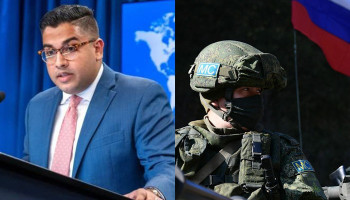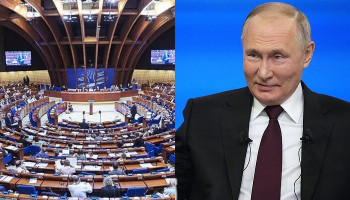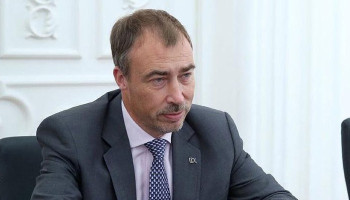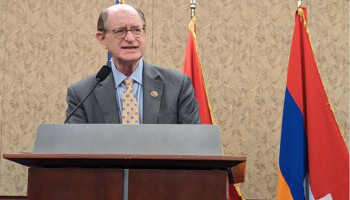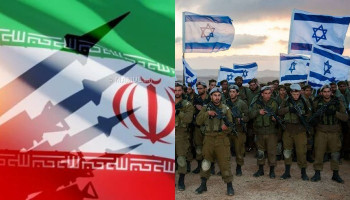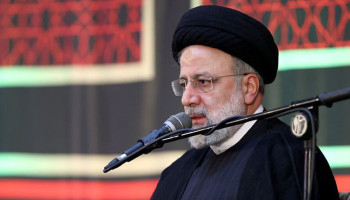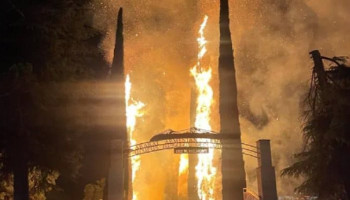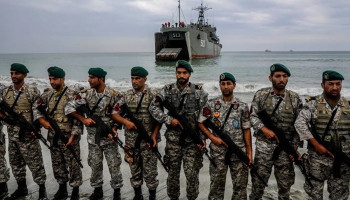Rival accounts emerge from first Trump-Putin meeting
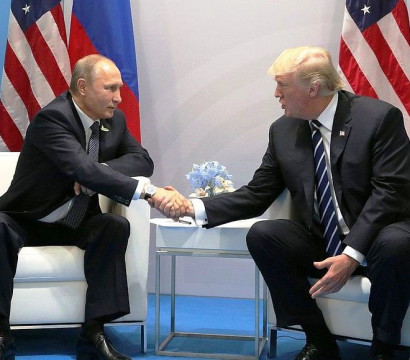 Donald Trump repeatedly pressed Vladimir Putin on Russia’s alleged interference in the US presidential election as the two men used their much-anticipated first meeting at the G20 summit to seek to reset the battered US-Russia relationship. But there were differing interpretations of what was said at Friday’s lengthy meeting in Hamburg, with Russian foreign minister Sergei Lavrov saying Mr Trump had “accepted” the Russian president’s assurances that Moscow had not meddled in the election. Rex Tillerson, the US secretary of state, said the two leaders had had “a very robust and lengthy exchange on the subject”, adding that Mr Trump had “pressed President Putin on more than one occasion regarding Russian involvement”. He said the two leaders had agreed that the issue was “a substantial hindrance in the ability of us to move the Russian-US relationship forward”, and that while Mr Trump had raised serious questions about Russia’s actions, he was “rightly focused on how do we move forward from what may be simply an intractable disagreement”. In a statement released after the meeting, Chuck Schumer, the top Democrat in the Senate, said: “For Secretary Tillerson to say that [Russia’s interference in the US election] will remain unresolved is disgraceful — to give equal credence to the findings of the American intelligence community and the assertion by Mr Putin is a grave dereliction of duty and will only encourage Russia to further interfere in our elections in the future.” Mr Trump has repeatedly refused to endorse the conclusions of the US intelligence community that the Kremlin was behind last year’s cyber attacks on the Democratic National Committee and Hillary Clinton’s campaign. But he has come under mounting pressure from Republicans in Washington, concerned by Russia’s actions in Syria and Ukraine as well as its alleged interference in the US campaign, to raise the issue with Mr Putin. Please use the sharing tools found via the email icon at the top of articles. Copying articles to share with others is a breach of FT.com T&Cs and Copyright Policy. Email licensing@ft.com to buy additional rights. Subscribers may share up to 10 or 20 articles per month using the gift article service. More information can be found at https://www.ft.com/tour. At the meeting, which was supposed to last about 30 minutes but ended up stretching to more than two hours, the two men took in the crises in Syria, North Korea and Ukraine, with officials noting a revival of Russian-US co-operation on all fronts. Mr Tillerson announced after the encounter that the two men had agreed to implement a ceasefire in south-western Syria. Mr Tillerson described the meeting as “very constructive”. “The two leaders connected very quickly. There was a very clear positive chemistry between the two,” he said. The secretary of state added that Melania Trump, the first lady, had entered the room after about an hour to urge the two men to wrap up their meeting, but they continued talking for a further hour. “Clearly she failed,” he joked. Mr Lavrov said there was a recognition “that the US and Russia can only secure their national interests if they work together” to resolve conflicts around the world. One of those is the crisis in eastern Ukraine. Mr Lavrov said the US had agreed to appoint a special representative for the conflict, which would “create a channel” for Washington and Moscow to co-operate on implementing the Minsk accord — the agreement designed to end violence in the region. The two leaders’ first meeting was the high point of Friday’s G20 summit in Hamburg, and came when relations between Russia and the US, which were cool during the Barack Obama years, have in recent months plumbed new lows. Related article Please use the sharing tools found via the email icon at the top of articles. Copying articles to share with others is a breach of FT.com T&Cs and Copyright Policy. Email licensing@ft.com to buy additional rights. Subscribers may share up to 10 or 20 articles per month using the gift article service. More information can be found at https://www.ft.com/tour. The extended talks played havoc with Mr Putin’s schedule, making him late for a meeting with Shinzo Abe. In remarks broadcast by Russian TV, he apologised to the Japanese prime minister. “Many issues had accumulated — Ukraine, Syria, and other problems, including several bilateral ones,” he said. The two had discussed, among other things, the fight against terrorism and cyber security. Heather Conley, a Russia expert at the Center for International and Strategic Studies in Washington, said the long meeting had shown that the two leaders get along, but added that the history of US-Russia relations were littered with similar examples of the first encounters between leaders of the two powers. “Beware that every American president for the past twenty-five years has had a positive first meeting with a Russian president,” said Ms Conley. “This fits a similar pattern although the severity of the issues these two leaders addressed are more significant than any post-Cold War US president has had to address.” Ms Conley added that the summit had produced a “difficult position” of hearing two competing views about the discussions the leader had about alleged interference in the US election. “The Russian foreign minister who tells us that President Trump accepted that Russia did not interfere in our election (while) Mr Tillerson tells us that it is a disagreement that we can move beyond,” said Ms Conley. “Perhaps there isn’t that much difference between the two.” During the US presidential election Mr Trump pledged to repair relations with Moscow, and refrained from criticising Russia — one of the few big nations he did not attack during the campaign. This raised concerns in Washington, including among many Republicans, that he would adopt a much softer stance on Moscow despite US allegations that Russia had meddled in the election. But his intention to mend relations with Russia has been hamstrung by the FBI probe into connections between his campaign aides and the Kremlin. Experts say that has restricted his ability to make gestures towards Russia that might antagonise US lawmakers. With officials in Moscow watching in dismay as anti-Russian sentiment in the US grows, their expectations of Friday’s meeting were set low. They fell further this week, as Mr Trump’s rhetoric on Russia appeared to harden: In a speech in Warsaw on Thursday, he urged Moscow to halt its “destabilising activities” in Ukraine and cease support “for hostile regimes, including Syria and Iran”. On the eve of the meeting, officials in Moscow merely expressed the hope that the two leaders could put a brake on the downward spiral in US-Russian relations and restore a political dialogue that has, in effect, ground to a halt in recent months. Anything more than that would be unrealistic, they said. “The problem for Trump is that if he reaches some kind of new entente with Russia, his domestic opponents will use it as a political weapon against him,” said Andrei Kortunov, head of the Russian International Affairs Council, a government-backed think-tank, who added that Mr Trump’s comments in Poland showed that he was “in no mood for making any serious concessions to Russia”. Mr Tillerson said one positive aspect of the meeting was “there was not a lot of relitigating of the past” because the leaders felt it was important for the two powers to find a way to work constructively together. “Both of the leaders feel that there is a lot of things in the past that both of us are unhappy with,” said Mr Tillerson. “The perspective of both of them was that this is a very important relationship, the two largest nuclear powers in the world . . . How do we start making this work?” |











